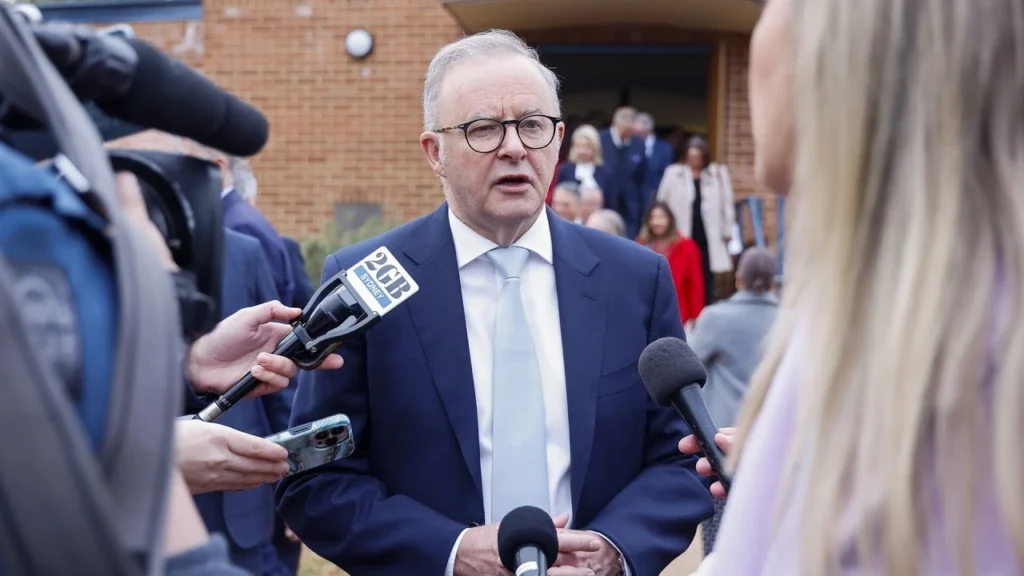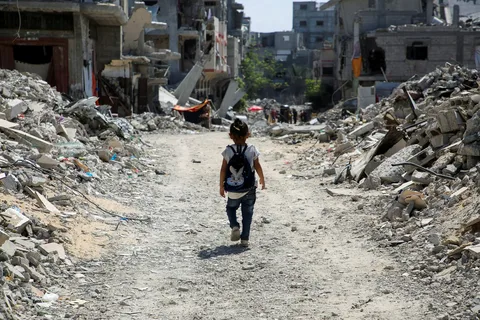Australia Stance is getting closer to recognising Palestinian statehood under Prime Minister Anthony Albanese. This is a big step that goes along with the growing global push for a two-state solution. Albanese’s government has joined 14 other countries in claiming that recognising Palestine as a state is a “essential step” towards peace in the Middle East. But the choice hasn’t been easy, especially because of the ongoing conflict within Israel and Palestine and the current humanitarian crisis in Gaza.

Australia’s View on Palestinian Statehood
For a long time, Prime Minister Albanese has been in favour of a two-state solution, which would give Palestinians their own state and Israel the right to exist within safe borders. Australia hasn’t swiftly promised to recognise Palestine, but Albanese has made it clear that such a promise is unavoidable. However, the timing is still very important to making sure that the recognition will help bring about a peaceful solution in the area.
Albanese said in recent remarks, “We’re looking at scenarios in which recognition will help the goal of creating two states.” His goal has been to make sure that recognising Palestine is in line with the goal of encouraging peace between Israel and Palestine instead of making the conflict worse.
The Growing Global Move Towards Recognition
Australia isn’t the only country considering this move. The international community is changing its opinion about Palestinian statehood in a big way. A number of Western countries have said they will recognise Palestine as a state. Keir Starmer, the Prime Minister of the UK, said recently that the UK would recognise Palestinian statehood by September, but only if Israel agrees to a ceasefire and commits to a long-term peace process. French President Emmanuel Macron has also promised to recognise Palestine in September, which will be a historic change for both countries.
People think that France and the UK’s decision goes against the usual Western view that recognition ought to occur after Israel and Palestine have come to a final agreement. They are taking this stance because people are getting more and more frustrated with terrorism in Gaza, the failure of peace talks, and the worsening humanitarian situation in the area. These countries are no longer waiting for a perfect solution before taking action; they now see the need for international leadership right away.
The Palestinian Authority’s Position and Its Obligations to the World
The Palestinian Authority (PA) has made a lot of progress in meeting international expectations in the last few months. For example, they condemned the October 7 attack, asked for the release of Israeli hostages, and promised to disarm Hamas. These steps have been very important in getting support from other countries for recognising Palestine as a state. The PA said on June 10, 2024, that it supported a demilitarised Palestinian state, promised to hold elections in 2026, and promised to disarm Hamas. This is still a key condition for many countries, including Australia.
Penny Wong, Australia’s Foreign Minister, recently signed a joint statement with 14 other countries, including France, Canada, and New Zealand, in support of Palestinian statehood and the need for reform in Palestinian governance. The statement also makes it clear that Hamas should not be part of any future Palestinian government. This makes the Palestinian Authority even more significant as Palestine’s main representative in diplomatic efforts.
What Israel is worried about and how it is reacting
Even though a growing number of nations are supporting the idea of a Palestinian state, Israel strongly opposes it, especially right now when the world is politically unstable. Israeli leaders, including Prime Minister Benjamin Netanyahu, have said that recognising Palestinian statehood without enough structures for government would reward Hamas and make Israel less safe. Netanyahu has been very clear about how dangerous it would be to create a Palestinian state while Hamas, a known terrorist group, still has power in Gaza.
Israel says that a Palestinian state should only be recognised after full peace talks that deal with safety concerns and make sure that both Israel and Palestine can survive. People are concerned that recognising Palestine in these circumstances could give Hamas more power and be a strategic win for the group, which could make the region even less stable.
The United States, which is Israel’s closest ally, feels the same way. U.S. President Donald Trump and other American officials have said that recognising Palestinian statehood at this time would reward Hamas and make it more diligently to make peace, even though they know there is a humanitarian crisis in Gaza. Trump has especially distanced himself from what France and the UK have done, saying that recognition would only make Hamas stronger and make it harder to reach a deal in the future.
The humanitarian crisis in Gaza is a big reason why.
The ongoing humanitarian crisis in Gaza is at the heart of the push for Palestinian statehood. Since the war got worse in October 2023, Israeli military operations murdered more than 60,000 Palestinians. The terrible conditions, such as starvation, lack of medical supplies, and a severe lack of basic goods, have caused outrage around the world and calls for immediate action.

The UN has called the situation in Gaza “catastrophic,” with millions of people facing severe hunger and malnutrition. Leaders in France and the UK have both said they are anxious about these conditions, and both countries have said that the humanitarian crisis is a major reason why they support Palestinian statehood. They say that recognition is not just a symbolic act but also an important step towards bringing a truce to the area and ending the suffering of the Palestinian people.

Recognising Palestinian statehood in this crisis would show that Australia cares about human rights and the rule of law around the world. It would also strengthen Australia’s support for the two-state solution, which would allow Israel and Palestine to live together peacefully.
Debate at home – Supporters and opponents of recognition
In Australia, the question of whether to recognise Palestinian statehood is still a hot-button issue. Some Labour Party members, like Ed Husic, are starting to support the idea that Australia should follow France’s lead. However, the Opposition has significant concerns about this. Senator Michaelia Cash and the remaining members of the Coalition have said that recognising Palestine while Hamas is still in charge of Gaza could put Israel’s security at risk and make peace efforts less effective.
Even with these worries, there is a lot of pressure within the Labour movement to recognise them right away. In Australia, pro-Palestinian groups and activists are also very vocal in their demands. Protests are calling for action in line with the international recognition movement.
Labour leaders like Penny Wong and Albanese have stressed the need for a balanced approach, saying that any recognition of Palestine should come with conditions, such as Hamas giving up its weapons and Israeli hostages being freed. This careful approach tries to avoid doing anything which could make things worse between Israel and Palestine.
The Way Forward for Australia
People are paying more and more focus on Australia’s stance on Palestinian statehood. The more countries, like France, the UK, and Canada, recognise it, the more pressure there is on Australia to do the same. Albanese has made it clear that recognition is not a question of “if” but “when.” However, the timing must be right to make sure that recognition helps make two states in a peaceful and safe way.
Australia is likely to keep becoming pressure from both inside and outside the country to take a stronger stand on Palestinian statehood in the next few months. As support for recognition grows around the world, Australia may need to work with other nations in the West to recognise Palestine at the United Nations in September, possibly joining France and the UK in this effort.
A small but important step towards peace
The issue of recognising Palestinian statehood is complex and has effects that go beyond the region. It still has a lot of symbolic meaning, but it is a significant advance towards peace in the Middle East. Australia’s decision to recognise Palestine will show that the country is dedicated to human rights, international law, and finding a two-state solution. As things get worse in Gaza, people all over the world are watching to see if Australia will be brave enough to recognise Palestinian statehood, along with its international partners, in the hopes of bringing lasting peace to the area.






